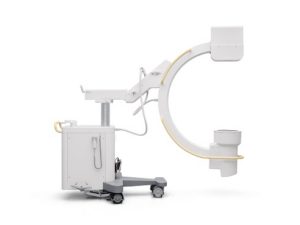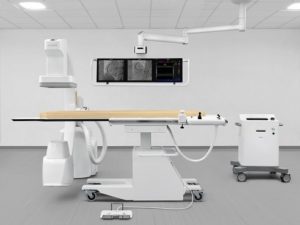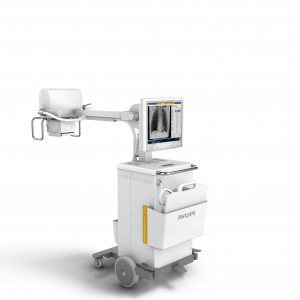We visited the Philips Healthcare Innovation Center in Pune last month, and spoke with Rekha Ranganathan, VP & Global General Manager, Mobile Surgery & Value Cardiology and Head of Healthcare Innovation Center at Philips.
Philips is doing interesting R&D and Manufacturing work in the healthcare space in Pune, and it was good to learn about the details from her and the Philips team.
Centers like the Philips HIC are good representatives of Pune’s strength in R&D and Manufacturing in core engineering. We hope that in the near future, Philips gets more actively connected with the tech and startup ecosystem in Pune.
Here are excerpts from our interview …
Can you give us an overview of Philips Pune?

surgical procedures, including trauma, spine, and pain management. Developed at Philips HIC Pune.
Philips has a long history in Pune, going back to the Philips Consumer Electronics Factory (established in 1971). The Philips Healthcare Innovation Centre (HIC) in Pune marks another milestone for Philips in India. It was set up in 2012. Philips Healthcare Innovation Center plays an essential role in Philips’ commitment to develop and produce meaningful products and solutions that help improve healthcare for people all over the world. In line with its strategy to expand the company’s global footprint, Philips commenced operations at its first green-field manufacturing facility for imaging systems in India, at Chakan Pune.
HIC Pune is one of the six global Philips’ facilities devoted to manufacturing healthcare technology. It is specifically designed with manufacturing flexibility in mind so that it can quickly adapt to the ever-changing market needs and deliver quality healthcare products that meet international standards, across the globe.
What types of healthcare technologies are being developed here at Philips Pune?

Since its inception, HIC Pune has launched six global products in the mobile surgery imaging & diagnostic space: Allura FC, Allura Centron, BV Vectra, Primary Diagnost, Mobile DiagnostOpta and Intuis. The last two being the latest releases from the unit. HIC Pune has successfully installed 1000 systems in more than 80 different countries, including countries from western European regions such as France, Italy, Austria, etc.
The state-of-the-art facility integrates research & development, sourcing, testing, assembly and manufacturing under one roof. The team of experts and best-in-class talent from top educational institutes work closely together to bridge the gap between better technology and actual clinical needs. The team’s rich experience in medical product development ensures that the products are designed for quality and reliability. The centre manufactures both interventional and diagnostic X-Ray systems.
How does Pune fit into Philips Healthcare’s global value chain (R&D, Manufacturing, Marketing)?
We are global management hub for Mobile Surgery which is part of the image guided therapy group. We are also one of the few centers globally that caters to emerging and developed markets end-to-end. We are the headquarters for few of the product segments globally in DXR. This means we are responsible for the product strategy, technology roadmap, product program, new product development and life cycle maintenance. Our products are shipped to 80 countries around the world – more products shipped globally. We will also be transferring the manufacturing of our premium mobile ‘C-Arm’ products from our factory in Best, Netherlands to Pune and evolving our current supply base here to meet the challenges of global quality, demand.
What are you future plans for expanding the role, scope of Philips Pune?
In the coming years, Philips HIC plans to expand its production capacity to get maximum efficiency from its factory in Chakan and will also look to widen its R&D portfolio, to bring in smart healthcare solutions for India and for the world , from its manufacturing base and the R&D centre in Pune.
What kind of R&D, Tech, Manufacturing capabilities exist at Philips Pune? Can talk a bit more about specific tech capabilities, skill sets, labs, manufacturing set up?

Philips Pune has an ‘end-to-end’ System Development Capability with strong competence on System Architecture, Imaging Chain, Mechatronics, System Software and System Engineering. We have created 6 New Products and released to Global Markets within a span of 4-5 years. In the 5 years since inception, we have been granted 5 patents. We create a strong culture of innovation – we have an internal “Innovation Day” to encourage idea sharing; some of which also have potential for patents. We also work closely with our global organizations to participate in competitions globally and develop the innovation ecosystem.
What challenges did you face in setting up this center?
Availability of technical talents who had experience in ‘End-to-End’ Product development was a problem early on. Also, the creation of full eco system with Supply base, Supply Chain, Manufacturing and Innovation along with understanding of global customer requirements was a key challenge.
What advantages do you see in the Pune tech and manufacturing ecosystem?
Pune has a good core engineering and manufacturing ecosystem. According to latest Zinnov research Pune has the highest number of Core engineering R&D centers and there is a good eco system of suppliers located around Pune. Also the availability of good technology and engineering talent here.
What challenges do you run into at Pune? (Hiring, Quality Talent, Infrastructure, etc.)
Hiring good system architects is a challenge. We are looking for systems architect with high-level thinking, who can have a global approach to product development.
Is Philips India/Pune plugged into the startup ecosystem?
Not yet. But we hope to explore the possible synergies.